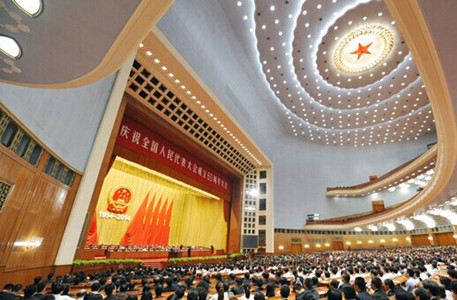People’s congresses thriving in 60th year

The Great Hall of the People is the venue for the National People’s Congress. It symbolizes the pride and dignity of the Chinese peoples of all nationalities. Recently, a conference was held here to celebrate the 60th anniversary of establishing the People’s Congress system.(XINHUA)
Some 70 scholars in attendance discussed key issues, such as institution building within the people’s congress system, national governance and the historical background and development of representation theory and practice.
In 1954, the first National People’s Congress was convened, marking the establishment of the people’s congress system together with the promulgation of the constitution. As China’s basic political body, the people’s congress system has evolved with great vigour and vitality over the years.
Strengthening the system of people’s congress and its role as the highest organ of state power in deepening overall reforms as well as rule of law are of theoretical and practical significance.
Improving rule of law
Scholars at the symposium reviewed the achievements and shortcomings of representation within the context of national governance. Yang Guangbin, a professor at Renmin University of China said that judging from India’s experience, the so-called “political modernization” brought about by parliamentary democracy has translated into little improvement on governance.
“Therefore, China should not fixate on centralization or decentralization because the real path to the modernization of national governance is through the construction of a government that is capable but has restrictions on its power,” Yang said.
Yang Xuedong, a researcher at the Central Compilaton and Translation Bureau, said that the people’s congress system demonstrates the institutional advantages of improving the efficiency of national governance because of its organizational structure, which is conducive to coordinating relationships among governments at all levels, and a design that promotes cooperation among various governing bodies to ensure the implementation of national policies.
Yu Keping, deputy director of the Central Compilation and Translation Bureau, said that people’s congress, China’s top legislative body, is indispensible in promoting good law and governance.
“Good law is a prerequisite for good governance because without the rule of law, there will be no good governance, let alone modernization of national governance,” Yu continued.
Tian Hongjun, deputy director of the Research Office at the Standing Committee of the Beijing Municiple People’s Congress, said that at this crucial juncture for reform and development, there is an urgent need to address the fundamental, overall and long-term problems by system and law.
He added that rule of law can foster a common social understanding, boost institutional innovation, and guide reform and development as well as promote the modernization of national governance.
With regard to the existing problems in current legislation, Tian said: “The legislative goal needs to change from allocating power to accountability while improving legislation process and optimizing the allocation of legislative power.”
Grassroot political bodies
Scholars agreed that injecting vitality into the people’s congress system within the framework of laws and regulations is essential.
Xu Chengfang, a professor at Dalian University of Technology, said that it is of vital importance to determine who should be elected and the number of people elected to enter the National People’s Congress and its standing committee at all levels.
Xu suggested that the number of deputies and the proportion of officials should be reduced while competitiveness of elections should be enhanced.
Lang Xingyou, a professor from the School of Public Affairs at Zhejiang University talked about his experience at the people’s congress station in Wenling, Zhejiang province.
He said that a mechanism for the unimpeded expression of interests was constructed at the station by fully utilizing institutional political resources. This offered an effective platform for grassroots deputies to fulfill intersessional duties, ensuring the smooth operation of the people’s congress system.
Wang Xutian, a professor at Renmin University of China, explained the relationship and interactions of the representation and dispatch systems through the standing committee of the regional people’s congress and neighborhood committees. In his opinion, the dispatch system is an important supplement to the local people’s congress system because it plays a crucial role in maintaining the efficient operation of the system and governance.
Dating back to history
Scholars also discussed the histrocial evolution of representation in China at the symposium.
Wang Qisheng, a professor at Peking University, said that the attitude toward the idea of representation shifted from regarding a legislature as a sacred thing to hatred of it among the intellectual class. It is noteworthy that in 1913, public opinion on the legislature was mainly aimed at the people holding office instead of the system itself.
However, because China saw a diplomatic failure at the Paris Peace Conference in 1919, and the West became disillusioned with the system of representation, scholars turned to Russia’s Party and politcial system for an alternative, Wang continued.
Liu Yigao, a professor at Peking University recalled the grassroot elections during the convening of the first session of the National People’s Congress and concluded that though system design was progressive and included extensive political participation of the masses, grassroot election system was in an urgent need of improvement due to the lack of adequate and effective operation.
Policy control works much better than legal procedures in grassroots elections, Liu added.
The Chinese version appeared in Chinese Social Sciences Today, No. 680, Dec.10, 2014
The Chinese link is: http://www.cssn.cn/index/index_focus/201412/t20141211_1437789.shtml
Translated by Yang Xue
Revised by Justin Ward

 PRINT
PRINT CLOSE
CLOSE